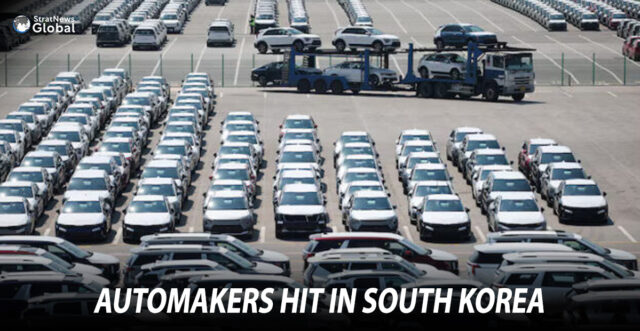In a setback for South Korean carmakers, shares of Hyundai Motor and Kia Corp fell on Thursday after US President Donald Trump announced a 15% import tariff on South Korean goods, including automobiles, as part of a new trade agreement.
While the agreement reduces auto tariffs from 25%, it removes the 2.5% advantage in tariffs that South Korean automakers had enjoyed over Japanese rivals under the Korea-US free trade deal.
Some analysts said the share falls may have been driven by profit-taking as news of the tariffs was already factored in after South Korean automaker shares surged last week following news that Trump agreed to reduce Japanese auto imports to 15%, a move that stoked optimism about a similar deal for Seoul.
Tariff Cuts ‘Fortunate’
South Korea’s auto association said the tariff cuts are “fortunate” and said it removes uncertainty and creates a level playing ground with Japanese and European rivals.
Hyundai Motor said the deal “validates our unwavering confidence in the US market and our commitment to American manufacturing”.
Hyundai Motor Group in March announced a $21 billion investment in the United States with Trump at the White House, including a $5.8 billion steel factory and an expansion of Hyundai Motor’s new car factory in Georgia.
Before Washington imposed 25% auto tariffs in April, there were zero tariffs on most South Korean auto imports under a bilateral trade deal, while there was a 2.5% tariff on Japanese auto imports.
South Korean negotiators demanded 12.5% auto tariffs, but Trump wanted the rate to be 15%, the presidential office said.
Hyundai Motor shares fell 4.5% and Kia Corp stock lost 6.6%.
‘Crossed A Big Hurdle’
Announcing the tariffs, Trump wrote on Truth Social: “I am pleased to announce that the United States of America has agreed to a Full and Complete Trade Deal with the Republic of Korea.”
The negotiations were an early test for South Korean President Lee Jae Myung, who took office in June after a snap election. He said the deal had eliminated uncertainty in the export environment and set US tariffs lower than or at the same level as major competitors.
“We have crossed a big hurdle,” Lee said in a post on Facebook. Trump said Lee would visit the White House “within the next two weeks” for his first meeting with the US president.
(With inputs from Reuters)





